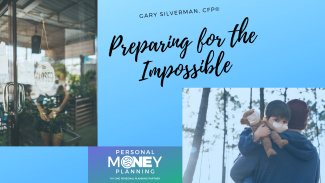
Financial Preparedness in Impossible Times
By Gary Silverman, CFP®
First, let me emphasize that an emergency fund will not protect you from every emergency. Life has this habit of dreaming up emergencies that we never thought of. Take COVID-19. One of the hardest hit areas of commerce that is being affected is the restaurant industry. Let’s look at some problems they face.
Many people are afraid to eat at a restaurant. The government tells them they must shut down for many weeks. Then when they open, they can only open at a lower than break-even capacity. They must start providing protective equipment to staff and customers. They have to take time and do a deep clean between diners. And they have to get lucky that none of their staff gets sick while being exposed to multiple groups and each other in a confined space. Many are open now just to stop the bleeding…not to make a profit. Tips are down as customers are down. Owners are likely bringing home nothing.
Most restaurants are not the money-makers people think they are to begin with. Now imagine how much money they would have to reserve to get over this particular disaster. And to build that up, which expenses are they supposed to cut? It is unreasonable to expect a restaurant to build a reserve big enough to get through this crisis unscathed.
Families have this same issue. Should you build up a fund that can handle a job loss that lasts over a year while protecting the kids’ college fund, continue to take care of mom and dad in the retirement home, and deal with the dreaded “max-out-of-pocket” expenses from a medical issue, flooding of your home, and total loss of your car?
No, an emergency fund won’t make the ramifications of all emergencies go away. It will get you through most easily, some with a few lifestyle changes, and at least moderate the pain if you have a worst-case scenario play out.
Given that, there are some things you’ll need to do as we look at what size and style of emergency fund you can set up:
- Are you saving enough for your next vehicles? The kids’ college (if you want to fund this)? Your retirement?
- What debt do you have? What debt do you have access to? How accessible is that access?
- What does your budget look like? Do you have cash left over at the end of a pay period? Do you know how much of your spending is discretionary? Do you know how much you are spending and where?
- How secure is your job? Your employability? Your pay?
- And what might mess up your financial life? Yes, I know it’s not a short list.
Next week we’ll delve more into the process of building up your financial ability to weather the next crisis.
Gary Silverman, CFP® is the founder of Personal Money Planning, LLC, a Wichita Falls retirement planning and investment management firm and author of Real World Investing.

